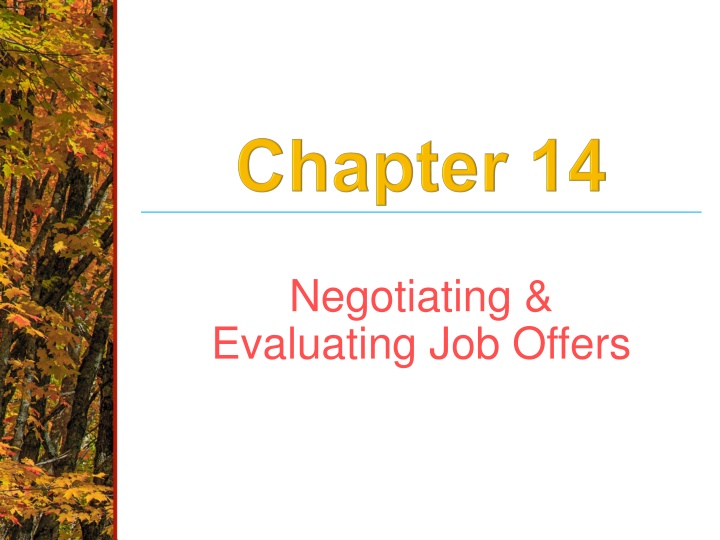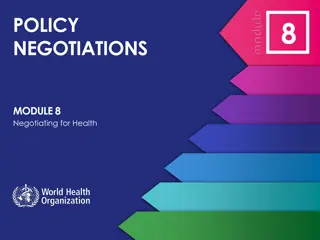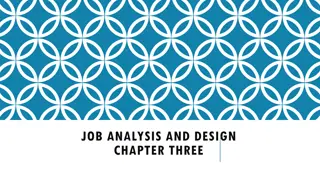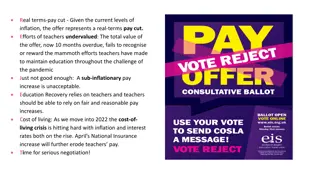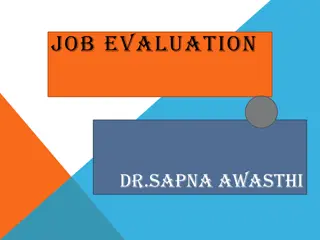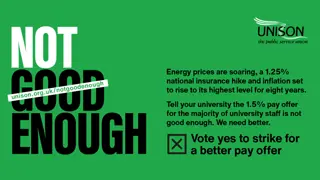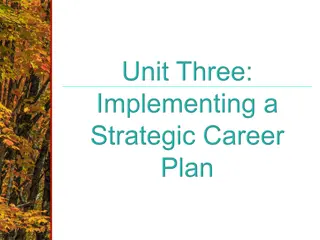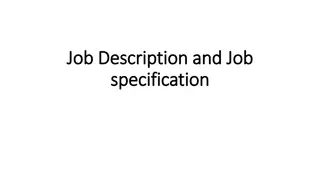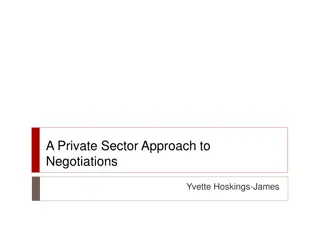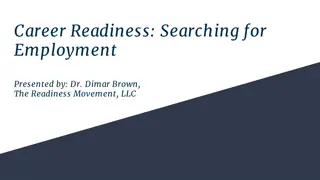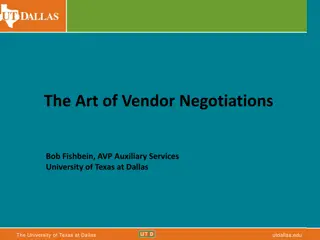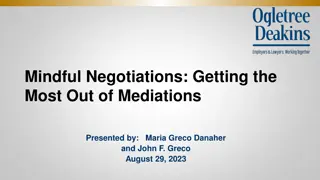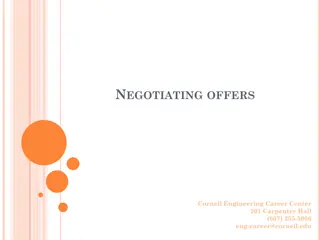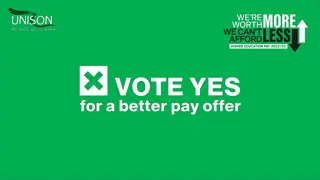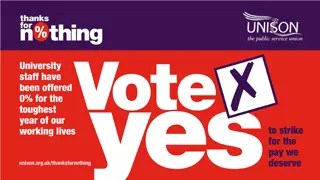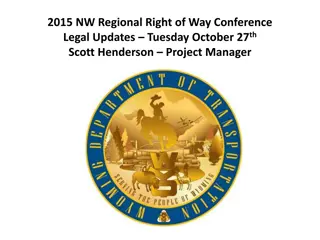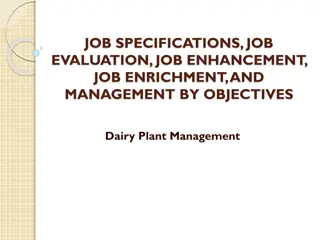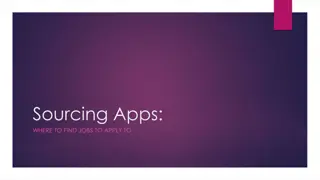Mastering Job Offer Negotiations: Strategies for Success
Explore the art of negotiating and evaluating job offers effectively. Understand the skills needed for successful negotiation from both student and employer perspectives. Learn about social power, maximizing bargaining power, and important considerations in evaluating job offers. Dive into the negotiating process, essential career readiness skills, job interview preparation, employer characteristics, and the significance of social power in job hunting. Discover tips for maximizing your bargaining power and securing the best job offer possible.
Download Presentation

Please find below an Image/Link to download the presentation.
The content on the website is provided AS IS for your information and personal use only. It may not be sold, licensed, or shared on other websites without obtaining consent from the author.If you encounter any issues during the download, it is possible that the publisher has removed the file from their server.
You are allowed to download the files provided on this website for personal or commercial use, subject to the condition that they are used lawfully. All files are the property of their respective owners.
The content on the website is provided AS IS for your information and personal use only. It may not be sold, licensed, or shared on other websites without obtaining consent from the author.
E N D
Presentation Transcript
Negotiating & Evaluating Job Offers
Presentation Overview Negotiating defined Student vs. employer views of skills needed to negotiate effectively Social power in negotiating Maximizing bargaining power What do you negotiate? Determining what s important to you in evaluating offers CIP perspective
The Negotiating Process Negotiating defined: to confer with another so What is your What is your previous previous experience experience with with negotiating? negotiating? as to arrive at the settlement of some matter What are employers seeking in applicants? What do job hunters seek?
Employer Ratings of Essential Career Readiness Skills See text Table 14.2 What class What class assignment assignment allows you allows you to highlight to highlight your skills? your skills? What skills are most essential for new hires? What are ways you can develop these skills?
Job Interview Preparation Know yourself values, interests, Which Which questions questions would you would you find find challenging challenging to answer? to answer? key skills employers value Review sample questions see Table 13.1 What value added might you bring to an organization?
What employer characteristics are most important to you?
Social Power in Negotiating Negotiating is a social process Social power changes over time in negotiation When does a job hunter have the most social power in the job search process?
Maximizing Your Bargaining Power 1) Knowledge about 5) Supply and demand yourself & employer 6) Other offers 2) Solid recommendations 7) Persuasion 3) Poise & confidence 8) Silent on salary 4) Inside recommendations
Receiving a Job Offer Timing of an offer Impressions still count Clarify the offer Learn about employment agreements Negotiate time of a decision Program hiring as a special type of job offer
Things to Negotiate: Salary Importance of research Minimum, realistic, dream Avoid mentioning a specific salary; talk about ranges Ask for more than you expect to receive
Other Things That May Be Negotiated Timing of appraisal reviews Signing bonus Sales commissions, profit sharing, stock options Job location Insurance, pension plans, other benefits Relocation expenses
Other Things That May Be Negotiated Expense account, car, mileage Relocation expenses Club memberships Start date Consumer product discounts Vacations/work schedule Office furnishing Division, department, title, Insurance, pension plans, classification other benefits Fulfillment & fun Relocation expenses
Some Additional Words About Salary Know what a job pays and know what you re worth Be informed about different ways to think about salary rates, e.g., hour, week, month, year Ask for time to clarify salary data Recognize role of initial salary in future jobs Never accept a job until you know the salary
The Process of Negotiating Decide your conditions How might How might your values your values influence what influence what you negotiate you negotiate for with an for with an employer? employer? Remain positive Make a decision Be honest with employers
Evaluating Offers: Making the Best Choice Clarity of career goals Managing the process The employer s sales pitch Ethical issues reneging on an offer Being sure about the job 10 factors to consider
The Matching Process Revisiting what is important to you Which of Which of these these factors factors would you would you focus on in focus on in evaluating evaluating offers? offers? Consider the factors in Table 14.3 Lifestyle Nature of the employer/job Pay and benefits Work activities
Final Steps Before You Start What happens before you sign your contract or appointment papers? What types of background checks does employer require? Importance of being honest about things in your background that might impact your employment
Using CIP and CASVE Cycle to Negotiate & Decide on an Offer What self-knowledge factors will be important in your decision? Values? interests? skills? employment preferences? Knowledge of options--specific facts about the employer and job
Analysis Phase Complete and accurate knowledge about self and job options How your decision-making style influences the process Role of negative and positive thoughts about the job offers received
Synthesis Phase Elaboration: Have you negotiated for your best options? Crystallization: Do you have all the information needed to narrow your options?
Valuing Phase Considering costs & benefits Some valuing questions to ask how does each job option fit your needs and lifestyle preferences? What other considerations are important, e.g., employer s reputation, community involvement? Ranking your offers determining a first choice (assuming you have more than one!)
Execution Phase Communicating with employers Acceptance Acceptance letters letters what what should should these these include? include? Accepting offer verbally and in writing Declining other offers
Executive Processing Extent to which you thought strategically in negotiating and evaluating job offers Handling input from significant others Influence of negative thinking in relation to offers received Process that requires self confidence and positive self-talk!
CIP Perspective Self-Knowledge Importance of self-knowledge in helping you decide on the best offer Option Knowledge Knowing about specific positions, along with organization s culture Decision Making Using the CASVE cycle to make decisions about job offers Executive Processing Importance of thinking strategically & not allowing negative thinking to impact your views of offers
Employment Decision-Making Case Study See Appendix L in text Assess level of importance and degree of match Which job offer should Elena accept?
